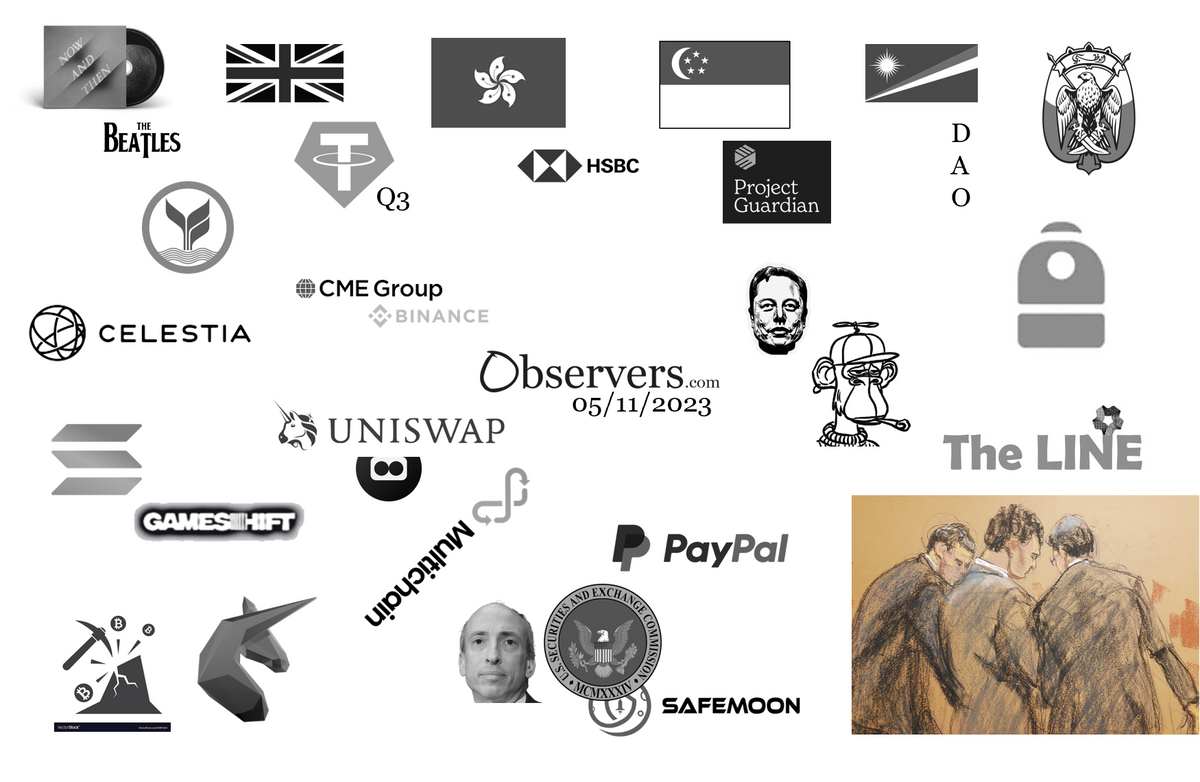
Arguably the most influential band of all time, The Beatles, unveiled their 'final' single this week. Undeterred by the fact that they officially split up 53 years ago, half of them are dead, and their last single came out almost 30 years ago, Now and Then was released at 2pm (GMT) on Thursday.
The surviving members used AI technology to extract John Lennon's voice from a demo tape made in the late seventies, and added new parts including rhythm guitar recorded by the late George Harrison in 1995. This earlier attempt to record the song was eventually abandoned, but advances in AI have enabled the single to finally be completed.
But what is very much Now in the crypto world this week, and what should really have been abandoned way back Then? Read on to find out...
Carrying the banner for Now, Celestia launched the mainnet of its game-changing modular blockchain, which promises a "new era in scalability" and should have a very bright future ahead of it. Not quite so bright a future lies ahead for Sam Bankman-Fried though, who was found guilty on all charges, and could be sentenced to over 100 years in jail.
Also on the wrong side of the law, two of the co-founders of SafeMoon were arrested by the DoJ this week on fraud charges, with a third still at large at time of writing. The SEC simultaneously filed civil charges for securities violations, in a rare case of the regulator actually doing its job, albeit closing the stable door after the horse had already bolted.
However, it wasn't long before it was back to its "arbitrary and capricious" ways, as it then issued a subpoena against PayPal regarding its stablecoin PYUSD. It looks like the SEC might try to claim the stablecoin as a security... because, errr, we all buy stablecoins for the massive potential profits they promise?? We questioned SEC chair, Gary Gensler's inconsistent views on crypto issues. Before he joined the regulator he was apparently all for a spot bitcoin ETF.
Leading stablecoin Tether released its latest quarterly statement of reserves, which didn't really reveal much, other than that stablecoin issuance appears to be turning into something of a cash cow. Sticking with cows briefly, inventive Bitcoin miners are using methane produced from landfill sites and cow manure, and have even mooted dead cow (an Argentianian oil reserve) to run their power-hungry machines.
The UK Treasury has revealed its plans for stablecoin regulation, covering payments, issuance and custody, and handing the reigns to the country's Financial Conduct Authority. The FCA also announced that it would join Singapore's Project Guardian initiative on DeFi and tokenization of real-world assets, along with regulators from Japan and Switzerland.
HSBC was testing tokenized deposits in Hong Kong with Chinese financial giant Ant Group, just as the government announced new regulations covering RWA tokenization in the territory. In Thailand, Kasikorn Bank bought a 97% stake in a major local crypto exchange, while retail investors increasingly look for divine inspiration.
The Marshall Islands has enhanced its legislative support for DAOs, speeding up their incorporation process and explicitly exempting their tokens from being considered securities. And the Abu Dhabi Global Market has set out a clear regulatory regime for organizations using distributed ledger technology.
Staying in the UAE, Dubai authorities have reportedly issued a VASP license to a not-yet-operational cryptocurrency exchange from the creators of the Backpack wallet and Mad Lads NFT collection. The exchange has high aspirations, proimising to be “dedicated to the ideals and principles the industry stands for.”
Meanwhile, the governance DAO of the Uniswap exchange has questioned a $12 million investment into an AMM exchange launched by a former engineer. And the well-respected CME exchange is gaining ground on market leader Binance when it comes to open BTC futures interest.
Following last week's exploit of the Maestro Telegram bot, this week Unibot was hit with a very similar exploit involving a new router, causing user losses of $560,000. And after over 100 days of inactivity, the Multichain network suddenly sprung back to life, although it appears that this was only to allow an insider to make a $1.6 million arbitrage profit. Still no sign of the missing CEO or the $1.5 billion reportedly confiscated by Chinese police, though.
Self-proclaimed expert-on-everything and petulant billionaire Elon Musk dissed NFTs while appearing on the Joe Rogan podcast, complaining about the fact that they are actually little more than a web link... which is actually fair enough, but had Bitcoin Ordinals fans falling over themselves to point out that their preferred NFT-esque platform of choice had no such issues.
While NFTs got an understandably bad rap (and rep) due to the degenerate greed that fuelled the boom and subsequent bust of the nascent market, they do represent a unique way to connect digital artists to their audience. We looked at some of the ways that artists can get past the past [sorry], and forge a new future for NFTs with their communities. In East Asia, non-fungible tokens appear to be less tainted by their speculative past, as gaming companies are increasingly turning to NFTs to provide users with true ownership of in-game assets.
Adding Web3 functionality to games just got a little easier, thanks to Solana Labs' release of its GameShift platform. The platform allows developers to implement features such as NFT in-game assets and a branded marketplace without previous blockchain knowledge. This extends to users who are able to interact with the resulting games using just an email login and credit card.
Finally, Saudi Arabia's NEOM investment fund, the investment arm of the country's 170km architectural folly in the desert, The Line, committed to a $50 million investment in Web3 gaming and metaverse company Animoca Brands. As part of the deal, Animoca and its subsidiaries will take residence in a new hub once the megacity is built... which is likely to mean a significantly longer commute for employees.
